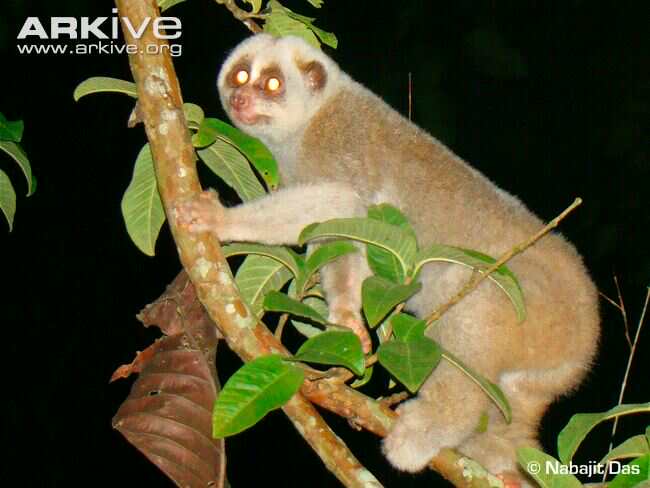Primates
You'll appreciate your thumb so much more after this.
We are primates, as are monkeys, apes, and those cute little lemurs in Madagascar. Primates are one of the newer orders of eutherian mammals. See if some of this sounds familiar. Primates have:

Slow lorises are monkey-like, without all the monkeying around. Image from here.
Monkeys, apes and humans are anthropoids. Monkeys can be divided into New World and Old World monkeys. (Europeans did the naming when North America was fresher in their minds.)
Apes include gibbons, orangutans, gorillas, and chimpanzees. There are no non-human apes in North or South America, unless you are visiting a zoo. Monkeys and apes are related but are separate groups.
For the record, humans did not descend from monkeys. We are a kind of ape, but we didn't descend from chimpanzees or gorillas either. We share a common ancestor. So, we are more like distant cousins. We're not a monkey's uncle and he isn't ours.

Two hominids, just hanging out together. Image from here.
After diverging from other apes around six million years ago, human ancestors began to walk upright. Stand on your own two feet. Other primates can't for long. The human skeleton is set up differently than that of other primates in order to be bipedal, or walk on two legs. Humans have a wide pelvis to support more weight. The spine enters into the skull more directly beneath the head. Human legs are larger and more specialized for walking while the front limbs are freed up to do other things.
Humans have the ability to interact with and alter their environment like no other creature. With our large brains and talented hands, humans make elaborate tools. Don't just think bow and arrow, think smartphone. We radically change our environments to suit our needs. Human brains work with symbols and language and sort through complex abstractions like mathematics and philosophy and who's going to win the Super Bowl. From religion to politics to YouTube, we take social behavior to a new level.
We are not the first hominids, or human-like primates. Scientists debate and restructure our family tree as we discover new fossils and find new ways to test them. In general, though, we are the single remaining branch of what was a complicated family tree with more than a few dead ends.
We are primates, as are monkeys, apes, and those cute little lemurs in Madagascar. Primates are one of the newer orders of eutherian mammals. See if some of this sounds familiar. Primates have:
- Hands that can grab. The thumb moves towards the fingers, called an opposable thumb. Try using your hands without using your thumb.
- Loose shoulders so the front limbs can really move around.
- Nails instead of claws. Hard to pick fleas off your buddies with claws.
- Large brains capable of complicated behavior. Primates manipulate their environment, and each other, a lot.
- Excellent depth perception. This is very important so as not to fall out of the trees where many primates live.
- Good eye-hand coordination. This is also crucial to living in trees. Plus, what's the point of the great hands if you can't put them to use?
Ape or Monkey?
Primates are divided into two groups, prosimians ("premonkeys") and anthropoids. ("Anthro" means human, so these are the ones more shaped like us. We did the naming after all). The prosimians are primates like lemurs, lorises, and tarsiers and generally still keep to the trees. They are found in parts of Africa and Asia.
Slow lorises are monkey-like, without all the monkeying around. Image from here.
Monkeys, apes and humans are anthropoids. Monkeys can be divided into New World and Old World monkeys. (Europeans did the naming when North America was fresher in their minds.)
Apes include gibbons, orangutans, gorillas, and chimpanzees. There are no non-human apes in North or South America, unless you are visiting a zoo. Monkeys and apes are related but are separate groups.
- Generally apes are bigger than monkeys.
- Monkeys have tails and apes do not.
- Apes' front limbs are shorter than their back ones.
- Apes have larger brains and more complex behavior than monkeys.
For the record, humans did not descend from monkeys. We are a kind of ape, but we didn't descend from chimpanzees or gorillas either. We share a common ancestor. So, we are more like distant cousins. We're not a monkey's uncle and he isn't ours.

Two hominids, just hanging out together. Image from here.
After diverging from other apes around six million years ago, human ancestors began to walk upright. Stand on your own two feet. Other primates can't for long. The human skeleton is set up differently than that of other primates in order to be bipedal, or walk on two legs. Humans have a wide pelvis to support more weight. The spine enters into the skull more directly beneath the head. Human legs are larger and more specialized for walking while the front limbs are freed up to do other things.
Humans have the ability to interact with and alter their environment like no other creature. With our large brains and talented hands, humans make elaborate tools. Don't just think bow and arrow, think smartphone. We radically change our environments to suit our needs. Human brains work with symbols and language and sort through complex abstractions like mathematics and philosophy and who's going to win the Super Bowl. From religion to politics to YouTube, we take social behavior to a new level.
We are not the first hominids, or human-like primates. Scientists debate and restructure our family tree as we discover new fossils and find new ways to test them. In general, though, we are the single remaining branch of what was a complicated family tree with more than a few dead ends.